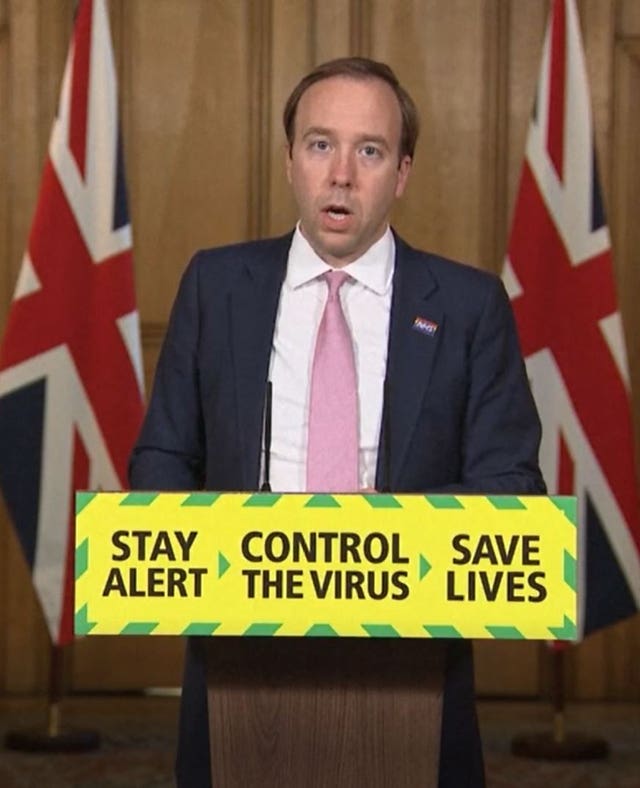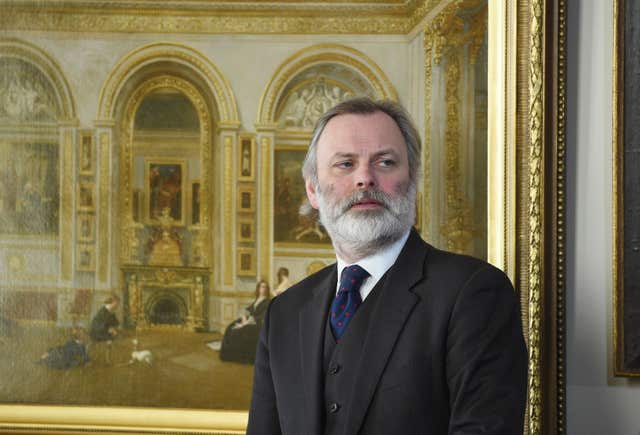
Britain will not join an EU programme to procure a coronavirus vaccine if one is successfully developed, Matt Hancock has said.
The Health Secretary said ministers had taken the decision after Brussels confirmed that the UK would have to abandon its own procurement efforts – which were at a more advanced stage – in order to take part in the scheme.
He said that signing up to the EU programme would leave the UK without a decision-making role as negotiations over purchases were made.
READ MORE: Coronavirus face masks: Everything you need to know about face coverings in Scotland
 Health Secretary Matt Hancock (PA)
Health Secretary Matt Hancock (PA)
Speaking to Times Radio he said: “We have chosen not to join the EU scheme on vaccine purchase. The reason is that it wouldn’t have allowed us to have a say in the vaccines that were procured, the price, the quantity, or the delivery schedule.
“We are further ahead than the EU schemes are. We would have joined the EU scheme if they had allowed us also to continue with our own negotiations, but one of the conditions of the scheme was that we would have had to stop our own negotiations and only do them through the European Commission and we weren’t prepared to do that.
“We think we will go faster this way.”
Health critics hit out at the UK's decision stating that the battle against Covid-19 called for global unity.
The SNP’s Shadow Brexit Secretary Dr Philippa Whitford MP said: “At a time when the UK should be accelerating efforts to work with our EU partners towards finding a vaccine, it is concerning that the UK government has instead rejected the opportunity to take part in yet another EU-wide programme.
“The UK government’s short-sighted and increasingly isolationist approach does nothing but hinder the ability to tackle the virus effectively.
READ MORE: World Health Organisation experts visit China to discuss Covid-19 probe
“It is not clear which potential vaccines may ultimately prove most successful. Therefore, the UK government must put public health ahead of Brexiteer ideology and step up efforts to engage with international partners to ensure that we are fully prepared around securing potential vaccines.
“The coronavirus does not see or respect borders, so it is crucial that the fight against the virus is a global effort and that the UK government takes all necessary steps to protect public health."
 Ambassador Sir Tim Barrow (Facundo Arrizabalaga/PA)
Ambassador Sir Tim Barrow (Facundo Arrizabalaga/PA)
As well as providing an update on the EU decision, Matt Hancock also confirmed the UK was already putting in contracts with vaccine developers around the world.
“We think that, because we are further ahead, actually the risk would have been to stop the UK procurements and instead be required to buy only through the European Commission route,” he said.
“I think it is actually better to continue with the work that we have been doing, not least, because we have got two of the top candidates here domestically, countries around the world are keen to engage.”
The decision not to join the EU programme was confirmed by Britain’s ambassador Sir Tim Barrow in a letter to the European Commission.
He said, however, that the UK was committed to strengthening its collaboration with the EU in other areas outside the vaccine procurement scheme.
“This could include sharing of information on promising vaccine candidates; negotiations with vaccine manufacturers; vaccine trials; manufacturing investment and capacity building; mitigations to supply chain bottlenecks and other delivery risks such as global trade disruptions,” he said.
Alex Harris, head of global policy at The Wellcome Trust, said the EU scheme had been “morally right” and hit out at the decision.
“The EU vaccine initiative’s cap on how many doses participating countries get is the best way to ensure there is enough vaccine for those in need in the rest of the world.
“Delivering vaccine according to need and not who can pay the highest price is not just morally right, but also the fastest way to end this pandemic.
“We urge the UK government to follow the EU’s lead and only secure vaccine doses for those who need it most (healthcare workers, over 65s and other vulnerable groups).”



Why are you making commenting on The Herald only available to subscribers?
It should have been a safe space for informed debate, somewhere for readers to discuss issues around the biggest stories of the day, but all too often the below the line comments on most websites have become bogged down by off-topic discussions and abuse.
heraldscotland.com is tackling this problem by allowing only subscribers to comment.
We are doing this to improve the experience for our loyal readers and we believe it will reduce the ability of trolls and troublemakers, who occasionally find their way onto our site, to abuse our journalists and readers. We also hope it will help the comments section fulfil its promise as a part of Scotland's conversation with itself.
We are lucky at The Herald. We are read by an informed, educated readership who can add their knowledge and insights to our stories.
That is invaluable.
We are making the subscriber-only change to support our valued readers, who tell us they don't want the site cluttered up with irrelevant comments, untruths and abuse.
In the past, the journalist’s job was to collect and distribute information to the audience. Technology means that readers can shape a discussion. We look forward to hearing from you on heraldscotland.com
Comments & Moderation
Readers’ comments: You are personally liable for the content of any comments you upload to this website, so please act responsibly. We do not pre-moderate or monitor readers’ comments appearing on our websites, but we do post-moderate in response to complaints we receive or otherwise when a potential problem comes to our attention. You can make a complaint by using the ‘report this post’ link . We may then apply our discretion under the user terms to amend or delete comments.
Post moderation is undertaken full-time 9am-6pm on weekdays, and on a part-time basis outwith those hours.
Read the rules hereLast Updated:
Report this comment Cancel